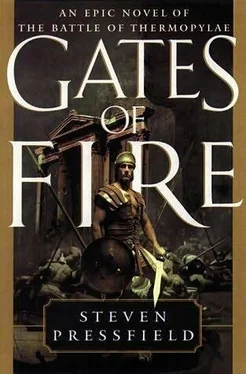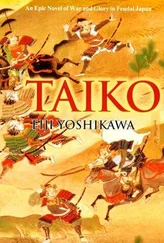Steven Pressfield - Gates of Fire - An Epic Novel of the Battle of Thermopylae
Здесь есть возможность читать онлайн «Steven Pressfield - Gates of Fire - An Epic Novel of the Battle of Thermopylae» весь текст электронной книги совершенно бесплатно (целиком полную версию без сокращений). В некоторых случаях можно слушать аудио, скачать через торрент в формате fb2 и присутствует краткое содержание. Жанр: Историческая проза, на английском языке. Описание произведения, (предисловие) а так же отзывы посетителей доступны на портале библиотеки ЛибКат.
- Название:Gates of Fire: An Epic Novel of the Battle of Thermopylae
- Автор:
- Жанр:
- Год:неизвестен
- ISBN:нет данных
- Рейтинг книги:3 / 5. Голосов: 1
-
Избранное:Добавить в избранное
- Отзывы:
-
Ваша оценка:
- 60
- 1
- 2
- 3
- 4
- 5
Gates of Fire: An Epic Novel of the Battle of Thermopylae: краткое содержание, описание и аннотация
Предлагаем к чтению аннотацию, описание, краткое содержание или предисловие (зависит от того, что написал сам автор книги «Gates of Fire: An Epic Novel of the Battle of Thermopylae»). Если вы не нашли необходимую информацию о книге — напишите в комментариях, мы постараемся отыскать её.
Gates of Fire: An Epic Novel of the Battle of Thermopylae — читать онлайн бесплатно полную книгу (весь текст) целиком
Ниже представлен текст книги, разбитый по страницам. Система сохранения места последней прочитанной страницы, позволяет с удобством читать онлайн бесплатно книгу «Gates of Fire: An Epic Novel of the Battle of Thermopylae», без необходимости каждый раз заново искать на чём Вы остановились. Поставьте закладку, и сможете в любой момент перейти на страницу, на которой закончили чтение.
Интервал:
Закладка:
He was going to speak of fear, for these unblooded youths whom he knew despite their silence, or perhaps because of it, had begun in their hearts to dwell upon the trials to come.
All my life, Dienekes began, one question has haunted me. What is the opposite of fear?
Down the slope the boar flesh was coming ready; portions were being shared out to eager hands.
Suicide came up, with bowls for Dienekes, Alexandras and Ariston, and one apiece for himself, Ariston's squire Demades and me. He settled on the earth across from Dienekes, flanked by two of the hounds who had noses for the scraps and knew Suicide as a notorious soft touch. To call it aphobia, fearlessness, is without meaning. This is just a name, thesis expressed as antithesis.
To call the opposite of fear fearlessness is to say nothing. I want to know its true obverse, as day of night and heaven of earth.
Expressed as a positive, Ariston ventured.
Exactly! Dienekes met the young man's eyes in approval. He paused to study both youths' expressions. Would they listen? Did they care? Were they, like him, true students of this subject?
How does one conquer fear of death, that most primordial of terrors, which resides in our very blood, as in all life, beasts as well as men? He indicated the hounds flanking Suicide. Dogs in a pack find courage to take on a lion. Each hound knows his place. He fears the dog ranked above and feeds off the fear of the dog below. Fear conquers fear. This is how we Spartans do it, counterpoising to fear of death a greater fear: that of dishonor. Of exclusion from the pack.
Suicide took this moment to toss several scraps to the dogs. Furiously their jaws snapped these remnants from the turf, the stronger of the two seizing the lion's share.
Dienekes smiled darkly.
But is that courage? Is not acting out of fear of dishonor still, in essence, acting out of fear?
Alexandros asked what he was seeking.
Something nobler. A higher form of the mystery. Pure. Infallible.
He declared that in all other questions one may look for wisdom to the gods. But not in matters of courage. What have the immortals to teach us? They cannot die. Their spirits are not housed, as ours, in this. Here he indicated the body, the flesh. The factory of fear.
Dienekes glanced again to Suicide, then back to Alexandras, Ariston and me. You young men imagine that we veterans, with our long experience of war, have mastered fear. But we feel it as keenly as you. More keenly, for we have more intimate experience of it. Fear lives within us twenty-four hours a day, in our sinews and our bones. Do I speak the truth, my friend?
Suicide grinned darkly in reply.
My master grinned back. We cobble our courage together on the spot, of rags and remnants. The main we summon out of that which is base. Fear of disgracing the city, the king, the heroes of our lines. Fear of proving ourselves unworthy of our wives and children, our brothers, our comradesinarms. For myself I know all the tricks of the breath and of song, the pillars of the tetrathesis, the teachings of the phobo-logia. I know how to close with my man, how to convince myself that his terror is greater than my own. Perhaps it is. I employ care for the men-at-arms serving beneath me and seek to forget my own fear in concern for their survival. But it's always there.
The closest I've come is to act despite terror. But that's not it either. Not the kind of courage I'm talking about. Nor is beastlike fury or panic-spawned self-preservation. These are katalepsis, possession. A rat owns as much of them as a man.
He observed that often those who seek to overcome fear of death preach that the soul does not expire with the body. To my mind this is fatuousness. Wishful thinking. Others, barbarians primarily, say that when we die we pass on to paradise. I ask them all: if you really believe this, why not make away with yourself at once and speed the trip?
Achilles, Homer tells us, possessed true andreia. But did he? Scion of an immortal mother, dipped as a babe in the waters of Styx, knowing himself to be save his heel invulnerable? Cowards would be rarer than feathers on fish if we all knew that.
Alexandros inquired if any of the city, in Dienekes' opinion, possessed this true andreia.
Of all in Lakedaemon, our friend Polynikes comes closest. But even his valor I find unsatisfactory. He fights not out of fear of dishonor, but greed for glory. This may be noble, or at least unbase, but is it true andreia?
Ariston asked if this higher courage in fact existed.
It is no phantom, Dienekes declared with conviction. I have seen it. My brother Iatrokles possessed it in moments. When I beheld its grace upon him, I stood in awe. It radiated, sublime.
In those hours he fought not like a man but a god. Leonidas has it on occasion. Olympieus doesn't. I don't. None of us here does. He smiled. Do you know who owns it, this pure form of courage, more than any other I have known?
None around the fire answered.
My wife, Dienekes said. He turned to Alexandras. And your mother, the lady Paraleia. He smiled again. There is a clue here. The seat of this higher valor, I suspect, lies in that which is female. The words themselves for courage, andreia and aphobia, are female, whereas phobos and tromos, terror, are masculine. Perhaps the god we seek is not a god at all, but a goddess. I don't know.
You could see it did Dienekes good to speak of this. He thanked his listeners for sitting still for it. The Spartans have no patience for such inquiries of the salon. I remember asking my brother once, on campaign, a day when he had fought like an immortal. I was mad to know what he had felt in those moments, what was the essence experienced within? He looked at me as if I had taken leave of sanity. 'Less philosophy, Dienekes, and more virtue.'
He laughed. So much for that.
My master turned sidelong then, as if to draw this inquiry to a close. Yet some impulse drew him back, to Ariston, upon whose features stood that expression of one of youthful years nerving himself to venture speech before his elders. Spit it out, my friend, Dienekes urged him.
I was thinking of women's courage. I believe it is different from men's.
The youth hesitated. Perhaps, his expression clearly bespoke, it smacked of immodesty or presumptuousness to speculate upon matters of which he possessed no experience.
Dienekes pressed him nonetheless. Different, how?
Ariston glanced to Alexandras, who with a grin reinforced his friend's resolve. The youth took a breath and began: Man's courage, to give his life for his country, is great but unextraordinary. Is it not intrinsic to the nature of the male, beasts as well as men, to fight and to contend? It's what we were born to do, it's in our blood. Watch any boy. Before he can even speak, he reaches, impelled by instinct, for the staff and the sword-while his sisters unprompted shun these implements of contention and instead cuddle to their bosom the kitten and the doll.
What is more natural to a man than to fight, or a woman to love? Is this not the imperative of a mother's blood, to give and to nurture, above all the produce of her own womb, the children she has borne in pain? We know that a lioness or she-wolf will cast away her life without hesitation to preserve her cubs or pups. Women the same. Now consider, friends, that which we call women's courage:
What could be more contrary to female nature, to motherhood, than to stand unmoved and unmoving as her sons march off to death? Must not every sinew of the mother's flesh call out in agony and affront at such an outrage? Must not her heart seek to cry in its passion, 'No! Not my son! Spare him!' That women, from some source unknown to us, summon the will to conquer this their own deepest nature is, I believe, the reason we stand in awe of our mothers and sisters and wives. This, I believe, Dienekes, is the essence of women's courage and why it, as you suggested, is superior to men's.
Читать дальшеИнтервал:
Закладка:
Похожие книги на «Gates of Fire: An Epic Novel of the Battle of Thermopylae»
Представляем Вашему вниманию похожие книги на «Gates of Fire: An Epic Novel of the Battle of Thermopylae» списком для выбора. Мы отобрали схожую по названию и смыслу литературу в надежде предоставить читателям больше вариантов отыскать новые, интересные, ещё непрочитанные произведения.
Обсуждение, отзывы о книге «Gates of Fire: An Epic Novel of the Battle of Thermopylae» и просто собственные мнения читателей. Оставьте ваши комментарии, напишите, что Вы думаете о произведении, его смысле или главных героях. Укажите что конкретно понравилось, а что нет, и почему Вы так считаете.












